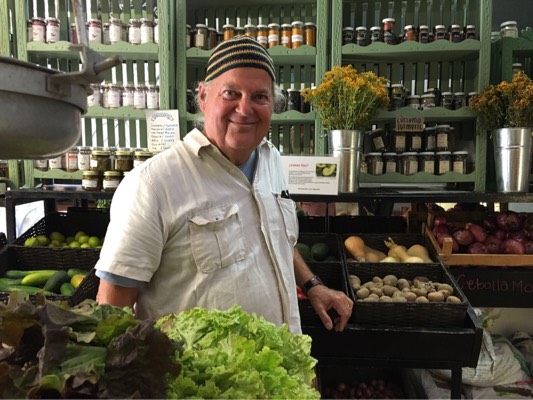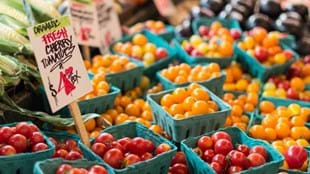FIT PLANET: Your new book reads like a call to arms – what inspired you to write it?
RONNIE CUMMINS: About ten years ago the climate crisis really started bothering me. But for the first time, I learned that most of the work I was doing on food and farming and organics and fair trade was a major part of the solution – actually changing our food and farming. So I became very enthusiastic, because it fit into what I was already trying to do, which was change the way our food and farming system works and educate our green-minded consumers about why they should eat what we call organic and regenerative food. And I read a bunch of books on alternative energy, but that is only half the solution. So I decided about three years ago that I was going to have to write a book, a roadmap, for how we would slow down or reverse global warming, and especially about how we have to change our food and farming system.
The book is quite positive, which is refreshing at a time when so much news can feel overwhelmingly bad – was that your intention?
One of the main things we've got to fight is this doom-and-gloom thinking – that it's all over, that we can't do anything about it. And that's what's so exciting about regenerative food, farming and land use – we only have to reduce our fossil fuel emissions by 50 percent in the next ten years if we can shut down the other 50 percent of our emissions through good old-fashioned photosynthesis. I mean, the bottom line is we've got too much carbon dioxide in the atmosphere and not enough carbon in our soils and trees and plants. We were in balance until about the year 1750. We had a lot more carbon and biological life in the soils. We had a lot more trees and plants. We can get back to that point. And there are practitioners all over the world proving that we can not only slow down global warming, we can actually reverse and then re-stabilize the climate. What a lot of people don't understand, though, is the relationship between solving the climate crisis and what we eat, what we buy and what we vote for. We just need to start thinking and acting belligerently, as I put it in my book, to stop the degeneration that really threatens us, right now.

Given the slow pace of change so far, why are you optimistic that we can do it in time?
I'm optimistic because for the last ten years I've studied soils and carbon sequestration, and what I've learned from talking to the world's top climate and soil scientists and agronomists is that we can sequester huge amounts of carbon relatively quickly if we put a priority on that. The top soil scientist in the United States told me that if you look at the trajectory of geological time, we should be heading toward an ice age right now. If we get the soil and forests regenerated we’d have to worry about that instead! We don't want too much carbon to be sucked down from the atmosphere and put into soils and trees, you know? Because we can literally change the climate and we can do it, not over 100 years, we can start to do it in the next ten years and we can stabilize everything within 30 years. But this next ten years is all-important.
Radical problems demand radical solutions, but radical doesn't mean impossible.
It will also be important that farmers, not just consumers, buy into these changes – what is your experience of their willingness to adopt regenerative practices?
Well, we set up a coalition over the last six months with the Sunrise Movement, the youth climate movement, called Farmers and Ranchers for a Green New Deal. In the beginning, it was kind of tough to get people to sign on to this because rural America is conservative. I mean, only 14 percent of us live in rural areas, but a lot of people in rural areas are confused and desperate. But this movement for regenerative agriculture lives as a solution to the climate crisis. You know, we've got a hundred million people in the US really concerned about their future and understanding that we've got to take control of our health. We have to take control of our diets, where we live, in our daily lives. We're an unstoppable majority and we all have to learn that this is a global problem, so you have to have a global solution. We're not going to solve this with small changes, you know? Radical problems demand radical solutions, but radical doesn't mean impossible. Nor does it mean something that we should be afraid of. It just means getting to the root of what's wrong and dealing with it. We can do that. We are going to do it. And the young people of the world will lead us there as our moral voices.
Alongside the political challenge is the scientific one, and there's a very strong movement within the food technology sector suggesting the laboratory, not the farm, might be the answer. How do you feel about food tech as a potential solution?
In theoretical terms, if technology could solve our problems, we're all for it. But if you look at genetic engineering over the last three decades, there hasn’t been any major contribution to sustainability or human health or any of the things we were promised. And I think a lot of people in the United States and all over the world are disgusted by our system of factory farming and institutionalized cruelty toward animals. You know, Americans eat 222 pounds of meat on average every year, supersizing themselves and leading the world in terms of chronic disease. The solution, though, is to get rid of the industrialized factory farm system. We should stop eating meat that comes out of factory farms, period. And if you're going to eat meat, you want to eat something that's good for your health and that's good for the health of the planet. And that's organic and regenerative.
Ordinary consumers may be aware of all this, and want to change, but simple economics is also a factor when factory food is often cheap food. How does an individual encourage or support, with their own wallet, regenerative agriculture in a meaningful way?
Polls show that the majority of people in the US now say organic food is better than chemical food. They know organic is better. And the majority of consumers say that they occasionally or frequently buy organic food. The major reason why people don't buy more organic food in the US is because, when they take out their wallet, there's not very much money in it. Eighty percent of the population lives from paycheck to paycheck, so solving this problem requires a strong emphasis on economics – a minimum wage, jobs fixing the environment, greening the economy through public education, health care, getting billionaires to pay their share of taxes, getting businesses to stop offshoring their tax responsibilities and so on. If people had a bit more money in their wallets their supermarket baskets would have a hell of a lot more organic food and grass-fed meat in them. People aren't dumb.
Every time you sit down to eat you're really casting a vote for what kind of agriculture there is.
You’re talking about systemic change, but also cultural change too – we will have to adapt our lifestyles if this is going to work, surely?
Right, we've had a cultural degeneration. It's like we barely know how to cook anymore. Wendell Berry – he's a well-known writer on food and farming – said that ‘eating is an agricultural act’. That is so profound. We have to understand that even if you're not a farmer, every time you sit down to eat you're really casting a vote for what kind of agriculture there is. It’s nonsense for people to say they can't afford organic food. What is true is that you can't afford not to eat organic food if you look at the medical bills you're going to be facing, if you look at the destruction of the environment and the climate. The best investment you can make is healthy food.
In the 1950s the average family in America paid 29 percent of their income for food. And we didn't hear people complaining the food was too expensive. Now we spend 11 percent of our household income on food, half of it eating out in restaurants, and we are supersizing and destroying our health in the process. Everyone knows about this right now, but we have to make it economically affordable for the majority. If we're going to have organic and regenerative [agriculture] become the norm, it will require changes not only in consciousness, but in public policy.
For any of this to happen we will need to see change soon – what will constitute meaningful progress for you by year's end?
We need to see a continuation of these protests by young people all over the world. Groups like the Sunrise Movement, Extinction Rebellion, For the Future. The pressure needs to be kept up. I think we need the media to start re-examining that we're dwelling too much on the negative. Let's highlight the positive. Let's get beyond this doom and gloom to talk about solutions. You know, let's stop wasting all of our time reading about the latest Trump soap opera stuff and let's spend some time learning about solutions – like the majority of cars sold in Norway last year were electric, that you can't build a new house in some parts of Europe unless it's carbon neutral. There's a way to farm that combines best traditional practices with cutting edge regenerative techniques. There's a way to restore our forests … There are solutions everywhere.
And we need to get our mental and physical health stronger, too. Because if you are worn out and unhealthy and spend ten hours a day staring at computer screens or smartphones, it's unlikely you're going to be a strong participant in this regenerative movement. We need to get outside, get exercise and get back in touch with nature. Get back in touch with ourselves and realize that each one of us is an incredibly powerful force. My book is about how one person can make a big difference to their family, to the people in their neighborhood and their co-workers, their friends. That's why I wrote this book, and I hope others will join in this process.
Learn more about the Organic Consumers Association here, and about Ronnie Cummins’ book, Grassroots Rising, here.








